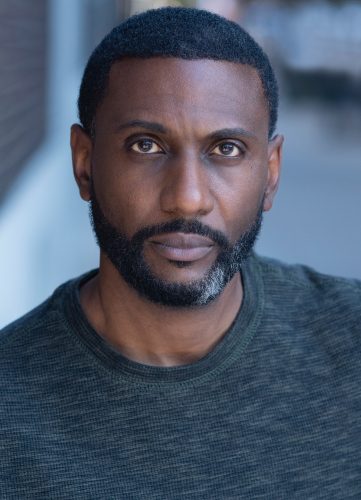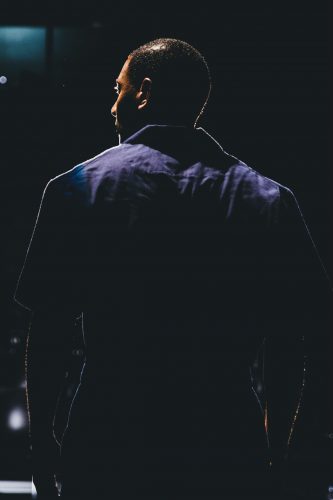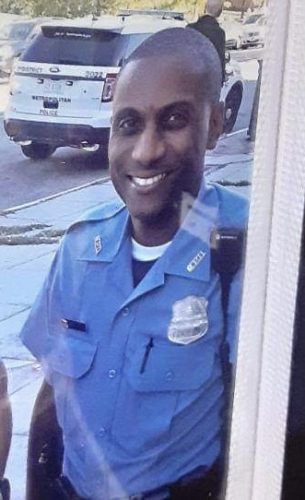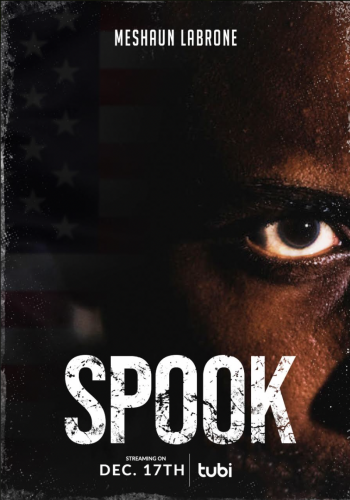Meshaun Labrone went from veteran police officer to political film writer/actor/director
“Nothing seems to challenge us anymore like the films of the past. I’m looking to change that.” – Meshaun Labrone

Meshaun Labrone
Over a 14-year career in public safety, Meshaun Labrone served as a D.C. police officer, a State of Florida Corrections Officer, and a Federal Officer. Physical stamina, mental agility, and conflict resolution were given skills while wearing the badge, but his creative fuel burned for the stage. He shifted his attention to writing, directing and starring in a number of stage performances, many with a political edge, including “POWER! Stokely Carmichael,” “Right to Remain: The Life and Mind of Tupac Shakur,” and “Spook” – a one-man play Labrone wrote that captured critical attention in 2018 at the Capital Fringe Festival in the District.
The show stared Labrone as a condemned cop whose last words before being executed for the murders of his fellow police officers explored institutionalized racism in America and the emotional toll of Black cops policing Black people. Rising DMV indie filmmakers Flying Scoop Productions led by Mark Finkelpearl and Nate Starck, turned the play into a 60-minute complex and at times uncomfortable film, which will be streaming on the free streaming service Tubi starting Friday, Dec. 17.
We sat down with Labrone to ask a few questions about arts, politics, and policing in D.C. and creating stories from a Black perspective.
Tell us about the transition from cop to playwright to actor/writer/director. These are such different skill sets!
Actually, I was an actor/writer from the age of five! I used to write short stories and read them to my mother. My mother and father put me in the drama club at my elementary school and they would come out and watch me in the annual Christmas and Easter plays. I was born to create. Later in life, I felt the urge to work in public safety and saw the need for people like myself to work in this field. And I miss it.
Although the two career paths are different, they do have the same essential skill set—communication. You have to have the ability to speak to people to get your point across and you have to able to listen. I was able to do that in public safety and I worked hard to do that in “Spook.”
What is it like being a playwright, and especially a Black playwright, in D.C.? How is acting/writing/directing for film different for you?
Being a playwright gives me the feeling that I finally have the power to create stories that I find interesting. We are living in a time where people are desperate for art with substance. People want unapologetic images and sound and films that aren’t cookie-cutter, manufactured and safe. Nothing seems to challenge us anymore like the films of the past. I’m looking to change that.
Your new film is pretty intense. What has been the reaction so far?
The reaction to “Spook” has actually very positive. It has caused an impact. One particular agent who read the script to the series and she said she couldn’t sleep for two days. A writer friend of mine read the film script and said that she could only read it once, the character was too realistic. A few police officers and former cops said that I really tapped into the dark side of what it means to be a cop.

Behind-the-scenes shot from the Tubi short film “Spook”
“Spook” was a one-man-play that was a hit at the Capital Fringe Festival. Why turn it into a film? Why turn to Producers Flying Scoop?
Flying Scoop was perfect because of co-director Nate Starck. As directors, we had a similar vision in making it a documentary style. We just bounced ideas off each other and hardly had any creative differences. Flying Scoop is a company that is not afraid to go to some risky creative places. That’s the kind of partnership I’ve dreamt about!
What do you want people to know about “Spook?”
I want people to know that “Spook” is all of us. He is our neighbor, relative, friend and enemy… he lives within us. Spook is America. If he is a bad guy, we need to look at the society that created him and examine it. Spook is our reflection, on the brink of total collapse. Rising crime, racial divisions and rising debt are putting people on the verge of “snapping”. We need to hold it together, and I think art can help with that.
…Rising crime, racial divisions and rising debt are putting people on the verge of snapping. We need to hold it together and I think art can help with that.” – Meshaun Labrone
The role you inhabit in the film is one of a cop gone bad. How did being an active-duty officer for over a decade inspire the way you wrote and acted in it?
I’ve been in public safety for 14 years and once you are working the streets or a correctional facility, you’re never the same. Yes, you are sworn to protect and serve, but in order to do that, you must be able to stop a person with force — sometimes deadly force. Having a mindset like that changes you. Dealing with people that have been severely injured or died, changes you and your perception of human beings changes.

Archival photo of Meshaun Labrone as an active duty police officer
That’s why I salute my brothers and sisters who served with D.C. police during the 1980s and 90s. I have so much respect for them because they did a job most people would not be able to do for an eight-hour day, let alone 25 and more years. During that time, D.C. had 500 murders annually. To endure that means strength. Having been trained by these officers, I adopted that mindset in order to survive. But there were some not as strong. Some committed suicide, others made attempts. Some became complete alcoholics. I allowed myself to tap into that dark place in my mind and brought forth this character. It was scary.
“I allowed myself to tap into that dark place in my mind and brought forth this character. It was scary.” – Meshaun Labrone
Anything you want people to know about your experience as a D.C. officer and what happens on duty?
Most officers join to really help people. But the good ‘ol boy culture still exists and if you’re not submitting to that idea, it will eat you up and spit you out. In order for it to change, you need the masses to come out in droves. Apply to be an officer and together you can uproot racism and plant freedom, justice and equality. Going in alone, the journey will be difficult.
Future projects?
We are in pre-production for my next project “Power! Stokely Carmichael.” That story will display the early years of the civil rights leader and the beginning of Black Power. My goal is to take “Spook” and turn it into a series, and to write a prequel to this film focusing on the correction officer that befriended Spook while he was incarcerated and the reporter who interviewed him.

“Spook” premieres on Tubi on Friday, Dec. 17.




